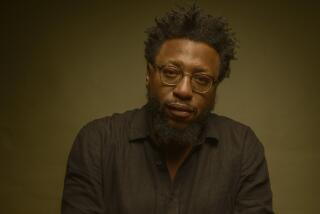Airman Remembered as a Hero
- Share via
Sobered after his first combat rescue mission in Afghanistan, Senior Airman Jason Cunningham wrote his wife a letter, preparing her for the worst.
He apologized for not always being the best husband and for the hardships she would face if he died.
“I could not leave this earth without saying goodbye to you. I will miss you and the girls immensely,” wrote Cunningham, who was killed three weeks ago in a firefight on a frozen Afghan mountainside. “Even though I wasn’t always the best husband, you have always been the best wife. I want you to know I died a happy man, happy that I met you and happy that I have two wonderful girls.”
In a shaky voice, his wife, Theresa, read that letter aloud Saturday during a memorial service for Cunningham at St. Mary Magdalene Church in Camarillo.
“Even in the face of danger, he was still thinking about us,” she said. “I keep looking for a reason why. Why? We were really happy. We had two children. Was this his time? Was it his destiny? We don’t know.”
About 150 people turned out for a memorial Mass in honor of Cunningham, who was buried in Arlington National Cemetery last week. Raised in Carlsbad, N.M., the 26-year-old considered Camarillo his home. His wife was born and raised there, and the two hoped to live there someday.
A portrait of the blue-eyed Cunningham, a member of an elite Air Force combat search and rescue unit, was in front of the altar. His commanding officer attended, and Msgr. John Hughes came out of retirement to perform the service.
“We want to celebrate the conclusion of a brief but full life,” Hughes said. “The death of a young man in the prime of his life is one of the mysteries we don’t understand.”
Cunningham, based at Moody Air Force Base in Valdosta, Ga., was one of eight soldiers from three services killed during an assault on an 11,000-foot-high mountain redoubt near the town of Gardez in eastern Afghanistan.
Maj. Vincent Savino, commander of the Air Force’s 38th Rescue Squadron that Cunningham was attached to, gave new details of the engagement that became America’s bloodiest battle to date in Afghanistan.
Cunningham was part of a quick-reaction force sent to rescue a group of soldiers pinned down by heavy machine-gun and rocket fire on a mountain slope. One helicopter had already been shot down when Cunningham’s unit flew in aboard another.
“They went in under heavy machine-gun fire. The helicopter was hit by a rocket and crash-landed,” Savino told the hushed church. “The pilot and co-pilot were wounded. Some of the Rangers on board had been shot.”
Cunningham, a paramedic, opened his rucksack and began treating the wounded. But the flames and smoke from the burning MH-47 helicopter forced him and another rescuer to move the wounded soldiers outside. As they maneuvered over the rocky terrain, gunfire and mortar shells rained down from entrenched Al Qaeda and Taliban positions above.
“Jason said they had to get these guys out of there. He ran across a direct line of fire to move the wounded men to another location,” Savino said.
He helped move the wounded three times to shield them from enemy fire.
“Jason was going back and forth treating his wounded comrades when he was shot,” Savino said. “He was shot but he continued to treat 10 wounded patients. They owe him their lives. The only reason they came home was because of Jason Cunningham. It doesn’t make it easier saying he died doing what he loved or that he was a hero, but that’s what he was.”
Another Californian, U.S. Navy SEAL Neil Roberts of Woodland, also died in the fight.
Before the battle of March 4 and 5, Cunningham had helped rescue eight crew members aboard a C-130 transport plane that had crashed in Afghanistan. He wrote his wife the letter she had earlier read after that experience.
“He’d seen the dangers of what happened there and he was afraid,” she said.
A month before his deployment in Afghanistan, Cunningham and his wife saw the film “Black Hawk Down” about a fierce battle between U.S. Army Rangers and Somali gunmen in Mogadishu.
She asked him why it was necessary for 10 men to go back to save one or retrieve a dead comrade.
“He said, ‘Wouldn’t you want someone to come after me? Those Rangers and pilots can do their jobs because they know someone is coming after them,’” she recalled.
Cunningham also is survived by his parents in New Mexico and his daughters--2-year-old Hannah and 4-year-old Kyla.
Theresa, 30, is a student at Valdosta State University in Georgia. She met her husband while they were both serving in the U.S. Navy in Naples, Italy.
She told how baby Kyla had vomited on his face as he spun her in the air. And how the couple never went to bed angry.
“He would never hang up the phone without saying he loved me,” she said. “He left nothing unsaid. I hear all about how he was a great soldier, but he was also a great man.”
More to Read
Sign up for Essential California
The most important California stories and recommendations in your inbox every morning.
You may occasionally receive promotional content from the Los Angeles Times.












